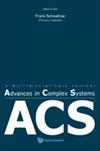基于多粒度点阵变换和不平衡数据分类的军事领域中文关系提取
IF 1
4区 数学
Q4 MATHEMATICS, INTERDISCIPLINARY APPLICATIONS
引用次数: 0
摘要
本文章由计算机程序翻译,如有差异,请以英文原文为准。
Chinese relation extraction in military field based on multi-grained lattice transformer and imbalanced data classification
求助全文
通过发布文献求助,成功后即可免费获取论文全文。
去求助
来源期刊

Advances in Complex Systems
综合性期刊-数学跨学科应用
CiteScore
1.40
自引率
0.00%
发文量
121
审稿时长
6-12 weeks
期刊介绍:
Advances in Complex Systems aims to provide a unique medium of communication for multidisciplinary approaches, either empirical or theoretical, to the study of complex systems. The latter are seen as systems comprised of multiple interacting components, or agents. Nonlinear feedback processes, stochastic influences, specific conditions for the supply of energy, matter, or information may lead to the emergence of new system qualities on the macroscopic scale that cannot be reduced to the dynamics of the agents. Quantitative approaches to the dynamics of complex systems have to consider a broad range of concepts, from analytical tools, statistical methods and computer simulations to distributed problem solving, learning and adaptation. This is an interdisciplinary enterprise.
 求助内容:
求助内容: 应助结果提醒方式:
应助结果提醒方式:


